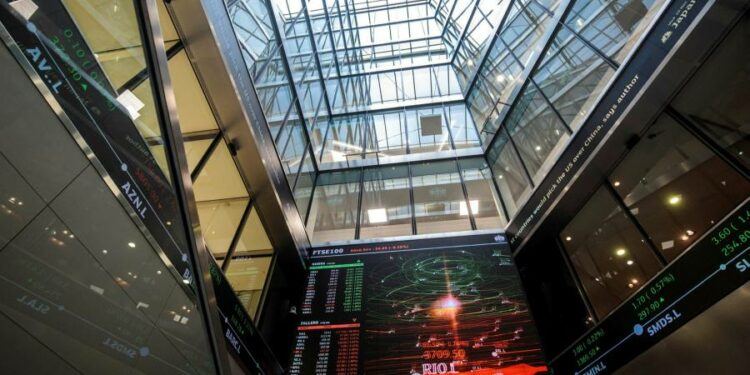UK stocks led European equities higher on Tuesday as investors banked on the Westminster government holding back from new coronavirus restrictions in England and survey data indicated China’s vast manufacturing industry was growing faster than analysts had expected.
The blue-chip FTSE 100 UK share index rose 1.5 per cent as its multinational commodities and banking stocks, which respond well to signs of robust global growth, outperformed.
The domestically focused FTSE 250 rose 2.2 per cent, led by travel shares, after leading epidemiologist Neil Ferguson told BBC Radio 4’s Today programme that Omicron cases in adults may have plateaued in London.
“The threat from further restrictions from Omicron seems to have receded and, of course, it is these restrictions that slow economic growth,” said Roger Lee, head of UK equity strategy at Investec.
Europe’s regional Stoxx 600 equity gauge added a further 0.9 per cent on Tuesday, building on a record high set in the previous trading session. London’s markets had been closed on Monday for a bank holiday.
On Wall Street, futures markets indicated the S&P 500 share index would open 0.4 per cent higher, building on a record high close on Monday, where the S&P was pulled up by gains for Apple and electric carmaker Tesla.
A purchasing managers’ index for China’s manufacturing sector, produced by Caixin and Markit, rose to a higher than expected reading of 50.9 for December. This drove the index — which collates executives’ responses to questions on topics such as hiring plans and new orders, and shows expansion when it rises above 50 — to its highest level since June.
The growth indicated that “the impact of scattered Covid-19 flare-ups was under control”, said Wang Zhe, senior economist at Caixin Insight Group.
Contracts that bet on the direction of the US technology-focused Nasdaq 100 index gained 0.2 per cent. This gauge rose 1.1 per cent on Monday as Apple became the first company to reach a market capitalisation of $3tn, highlighting analysts’ concerns that US equity markets are overly reliant on the performance of a group of large tech companies.
“The US economy looks to be deep into its business cycle, which typically sees market leadership narrow to mega-cap stocks,” said Tan Kai Xian, analyst at Gavekal, arguing that rising US wages would exacerbate this trend.
“At such moments, firms operating on thin margins are hurt most, and may turn lossmaking. In contrast, fatter-margin firms can keep growing,” he said.
“If the crutch of Big Tech was kicked away, then watch out,” said Patrick Spencer, vice-chair of equities at RW Baird. “The worry is that one of these very big tech stocks declines and that starts a waterfall of selling.”
In government debt markets, the yield on the US 10-year Treasury note, which moves inversely to its price and is sensitive to expectations of higher interest rates and inflation, rose 0.04 percentage points on Tuesday to 1.67 per cent. The same yield had risen more than 0.13 percentage points on Monday as Treasury prices fell sharply.
In Asia, Tokyo’s Nikkei 225 closed 1.8 per cent higher while Hong Kong’s Hang Seng index was flat.
Brent crude, the oil benchmark, rose 0.9 per cent to $79.73 a barrel ahead of a meeting among members of the Opec+ producer group.











